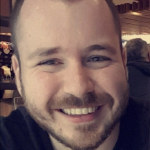ROGER GURR

A/Prof. Roger Gurr is the psychiatrist Clinical Director of headspace Early Psychosis, and has a conjoint appointment in the School of Medicine, Western Sydney University. He is a founder and Board Chair of the NSW Service for the Assessment and Treatment of Torture and Trauma Survivors (STARTTS). He is a founder of the Mental Health Services Conference Learning Network and Chairs its Mental Health Services Achievement Awards program. His extensive experience in the management of public and non-government mental health services has contributed several innovative models of care, funding methodologies, and organisational designs. He has been involved in human rights activities through leadership roles in Amnesty International Australia and the Australian Human Rights Council. He is passionate about providing effective services for the identification, assessment and treatment of developmental trauma, as it is the greatest cause of personal, family, social and economic pain.
Mirjana Askovic

Mirjana Askovic is a senior psychologist with 30 years of clinical experience in mental health. She is also a certified Neurofeedback Practitioner and Mentor as well as a QEEG Diplomate. Mirjana has been a clinician at the NSW Services for the Treatment and Rehabilitation of Torture and Trauma Survivors (STARTTS) since 2001. While working with severely traumatised clients, Mirjana recognised the need for interventions that could directly address the impact of trauma on the nervous system. She consequently introduced Neurofeedback and Peripheral Biofeedback to STARTTS in 2003 and pioneered the application of Neurofeedback and Heart Rate Biofeedback in working with refugees affected by torture and trauma. Mirjana was also involved in the development of the Applied Neuroscience Society of Australasia and the APS Neurofeedback and Psychology Interest Group. In 2007 Mirjana was given the responsibility to establish STARTTS’ Neurofeedback Clinic. Since then, this small clinic has developed into an internationally recognised Neurofeedback Centre for the treatment of refugee-related trauma. Mirjana is currently the coordinator of the STARTTS’ Neurofeedback Program and under her leadership, the Australian Neurofeedback Institute (ANFI) was launched in early 2019 as an activity of this Program.
Mirjana is a Ph.D. Candidate with the Discipline of Psychiatry at the University of Sydney. Her passion is to develop stronger links between scientific research and clinical practices to advance the field of trauma treatment. Her current research is focused on the examination of the mechanisms and efficacy of Neurofeedback in reducing symptoms of PTSD in traumatised refugees. She is a regular national and international conference presenter and trainer as well as the author of multiple publications on the integration of Neurofeedback and Psychotherapy in working with trauma survivors. For her contribution to the field of Applied Neuroscience in Australia, Mirjana was awarded ANSA Fellowship in 2017.
Dr Vivek Sharma

Dr Vivek Sharma completed MBBS and MD (Psychiatry) from King George’s Medical University in India. In Australia he has worked in a range of mental health setting including acute inpatient, community and forensic psychiatry. After realizing the limited impact of conventional medical treatments in severe mental illness, he developed a specialized interest in neuromodulation and went on to become Board-Certified in Neurofeedback by BCIA. He has trained in use of QEEG brain mapping- a novel investigative technique, which provide better precision in neurofeedback training and is currently in the final stages of accreditation in this discipline. Due to his combined knowledge of Medicine, Psychiatry and QEEG he has a nuanced understanding of therapeutic and adverse effects of medications on the brain and uses this knowledge to maximise therapeutic efficacy.
He has considerable experience in managing some of the most challenging neuropsychiatric conditions such as Obsessive-compulsive disorder, Autistic spectrum disorder and PTSD which are often underdiagnosed and respond poorly to conventional treatments. He has been using EEG-guided neurofeedback training to treat people suffering from developmental trauma, traumatic brain injury and chronic fatigue syndrome among other conditions.
He joined headspace-Early Psychosis in 2020 and was instrumental in setting up their signature Neurofeedback program. Currently his team is studying the efficacy of QEEG- guided neurofeedback training in young persons with early psychosis and comorbid developmental trauma as part of a novel research project, and preliminary results have been very promising.
Dr Sriram Rajasekar

Dr Sriram Rajasekar is a RANZCP accredited registrar in Psychiatry working with the headspace Early Psychosis program. He completed the Masters of Psychiatry degree at the University of Melbourne and MBBS in India.Dr Rajasekar is passionate about studying and applying Neurofeedback to young people exposed to developmental trauma, thereby assisting in their recovery journey. As an Associate investigator in this research project, his role includes on-site clinical co-ordination, identifying and resolving any study management issues.
Aydin Anic – Research Assistant MRes, MEd

PhD Candidate, Department of Psychology, Macquarie University
Aydin Anic has 5 years’ experience as a research scientist in the areas of psychology and cognitive neuroscience. He has completed a Master of Research majoring in psychology from Macquarie University, Sydney with a particular expertise on non-invasive brain stimulation. Throughout his education, he has accumulated a consistent track record of scholarly publications and high-level skills in academic writing, research design and methodology and data analysis.
Kristy Dawson

Kristy Dawson is a psychologist with clinical experience working in mental health since 2014. Kristy is currently undertaking accreditation in Neurofeedback and QEEG analysis, and is a Doctor of Clinical Psychology candidate at the University of Wollongong. Kristy has worked in various public and private clinical roles as well teaching on undergraduate and postgraduate psychology programs. Kristy works clinically with children, adolescents and adults impacted by trauma, and is particularly influenced by therapeutic approaches that address the neurobiological impacts of trauma. Kristy is currently involved in research and clinical practice that incorporates the adjunctive clinical benefits of biofeedback and neuromodulation interventions in the treatment of developmental trauma, including neurofeedback, heart rate variability biofeedback, and the Safe and Sound Protocol. Kristy joined the Headspace Youth Early Psychosis team in 2021 as part of an innovative research project exploring the benefits of neurofeedback in addressing the related impacts of developmental trauma and psychosis.